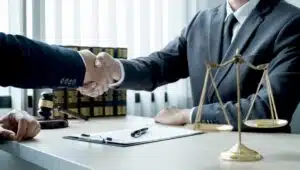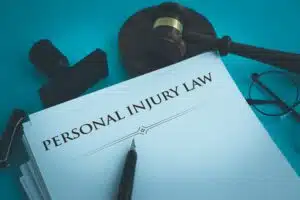If someone is pursuing damages from you, it can be very stressful. You might not know how to defend yourself against legal proceedings or worry about how much you might have to pay. You might feel as though the accident wasn’t your fault or that the person claiming personal injury compensation is exaggerating their injuries. Learning how to fight a personal injury lawsuit can, therefore, be very useful.
This might be after a road traffic accident, or perhaps you are an employer, and one of your staff was injured in a workplace accident. Those in control of areas open to the public can also be liable for personal injury if they fail to meet the duty of care owed to the public. Accidents of these types could leave you facing a claim for injuries, medical bills or even significant financial losses.
A solicitor could help you build a strong defence with you. Or, if a judgment has been made against you already, an experienced personal injury lawyer like those on our panel could negotiate with the other side and deal with your insurance company. This could reduce the amount of compensation you need to pay.
Read on to learn more about how a defence lawyer could help if you have a personal injury claim for compensation against you dismissed. Alternatively, if you have been injured in an accident that was not your fault, we may be able to help you claim. Contact us to see how we could help by:
- Calling 0330 043 3679
- Using our online “contact us” form to get started.

Browse Our Guide
- How To Fight A Personal Injury Lawsuit
- What Defences Could There Be In A Personal Injury Claim?
- What Factors Can Determine A Personal Injury Claim?
- More Resources About Personal Injury Cases
How To Fight A Personal Injury Lawsuit
If someone has brought a personal injury claim against you, you may be wondering how to fight a personal injury lawsuit.
Whatever the circumstances of the lawsuit that is being made against you, there are certain actions that you can take to prepare yourself:
Making Sure You Have Important Documentation
It’s vital that you can provide evidence that you did all you needed to in order to legally comply with a duty of care that you owed to someone else. So, some of the documents that might be useful in your defence are:
- A copy of the relevant accident book entry.
- Risk assessments.
- Confirmation of compliance with public liability standards in your business.
- Photos showing damage to your vehicle following a car accident. Experts might be able to look at this evidence and tell that the collision was at least only partly your fault.
- Fire certificates that prove all alarms and sensors were properly and regularly tested in any property you were responsible for.
Interviewing Witnesses
It is important to understand the personal injury case against you and assess its strengths and weaknesses. To do this, it can be helpful to interview any witnesses that you think will support your case. They might be able to provide evidence that you took the reasonable steps necessary to uphold your duty to the person making a claim against you.
Collecting Evidence
Similarly, photos and CCTV footage can be requested to present your side of events. Any video footage that captured the accident taking place may be able to show that you were not at fault.
Police and emergency services may also be able to provide you with copies of their reports. Evidence of this nature can help support your defence.
In some serious cases, it may be necessary to call on the opinion of specialists to defend yourself. It may be the case that a professional can tell that the claimants’ injuries were pre-existing or simply not caused to the extent and severity that the injured person claims.
The claimant has the option to bring in expert testimony, but so do you in your defence under certain circumstances. There may be expenses attached to doing this, but in the long run, it could be more cost-effective than paying an uncontested compensation amount. This will be very case-specific.
Seeking Specialised Legal Help
It’s important to note that it is not a legal requirement to use the services of a defence solicitor. However, with years of expertise helping clients defend themselves against an array of personal injury claims and other legal matters, it makes sense to consult one anyway.
Their insights and expertise could enable you to have the claim against you dismissed entirely or at least result in a lower injury compensation liability for you to pay.
Our advisors may be able to help you with any additional questions you may have about the personal injury claims process. Contact our team today.
What Defences Could There Be In A Personal Injury Claim?
Many potential defences are available to a defendant when fighting a personal injury lawsuit. They range from things as straightforward as the accident was not your fault to technical disputes over legal time limits or over the extent of injuries that were caused by the accident.
Some defences will be absolute and, if successful, will result in no damages being awarded to the claimant. Others are partial defences, and there may still be compensation due but at a reduced amount. Some example defences include:
- You did not owe a legal duty of care to the claimant at the time and place of the accident.
- The accident was the fault of the claimant.
- There is a different third party who was responsible for the accident.
- The claim against you is not genuine e.g. someone breaks their ankle playing football but is claiming that they did it on your premises.
- A claimant is partially responsible for an accident (known as split liability), e.g. two cars both change lanes without signalling and are found to each be 50% liable for the accident.
- The claimant contributed to their injuries (known as contributory negligence), e.g. you provide an employee with personal protective equipment (PPE), but they fail to wear it, and this failure makes their injuries worse.
- A claim has not been brought in the correct time limit, which under the Limitation Act 1980 is generally 3 years from the date of the accident. Notable exceptions include minors and people who lack the mental capacity to bring a claim, and they will usually have longer to claim, but a claim could be started on their behalf by a litigation friend.
Our advisory team can help answer any questions you may have about the personal injury claiming process. Contact them today.
What Factors Can Determine A Personal Injury Claim?
To prove a personal injury claim against you, the Claimant must show
- That you owed them a duty of care.
- You breached this duty.
- This breach caused injury.
When disputing whether you have breached your duty of care, some of the evidence discussed above will come into play:
- Witness statements.
- CCTV footage.
- Contemporaneous reports, e.g. accident book entries and police reports.
- Medical records.
When determining the size of the claim against you, evidence will also be crucial. It is important to remember that just because you have breached your duty of care does not mean there will be a valid claim against you. The breach of duty must have caused the injuries being claimed, which is a legal issue called ‘causation’. It might be that the Claimant’s symptoms would have happened even if the accident had not happened.
Contact Us
Hopefully, we have answered the question ‘How to fight a personal injury lawsuit?’. If you have been injured in an accident and you believe it was due to the fault of someone else, we may be able to help you. Contact us today to find out how by:
- Calling 0330 043 3679
- Using our online “contact us” form to get started.
More Resources About Personal Injury Cases
In addition to the information in this guide about how to fight a personal injury lawsuit, these other related guides from our website might be useful:
- This guide looks at how to report an accident at work here.
- Can an employer sack someone after an accident at work?
- Read about No Win No Fee agreements that can help you access legal representation.
External help:
- Read the duty of care outlined in the Health and Safety at Work etc Act 1974 (HASAWA) for employers.
- Also, the Occupiers Liability Act 1957 sets out the duty of care for those in control of public spaces.
- Finally, the Road Traffic Act 1988 and the Highway Code are outlined as part of road users’ duty of care to each other.
We appreciate your interest in our guide on how to fight a personal injury lawsuit. If you have any other questions or information, please contact our dedicated advisory team.




